Thank you to all who read PART ONE and PART TWO of our favorite books and good reads of 2023. Even as I shared a bunch, I keep thinking of other books I’ve read, happy Sunday afternoons and too many late nights, devouring the latest. Oh, I read a lot that I don’t truly love (an occupational hazard) and I can get worked up about stuff I find wrong-headed. Don’t get me started.
I love well-written, moving books (who doesn’t) and our tastes have evolved, I guess, over the years. I am not a scholar or academic but I do like to learn and have a curiosity about what might be good books, that sound intriguing, so I try a few fairly serious ones most years. (And if they are too dry or too heavy, I send ‘em back. Life’s too short to waste time on stuff I don’t enjoy at least a little…)
Here are twenty-four fairly academic books that I read (mostly; I’m not telling how many I finished and which I skipped a chapter or two and which ones I’m in the middle of, kinda. Ha.) These are really fine books, though, and while maybe not “the best” scholarly works, they are books that I value and we recommend. We want to honor the and their authors here as among my (serious) favorites of 2023. Congrats.
[Perhaps you noticed last week but a few from the previous list were pretty rigorous, too; I’m thinking of Abundantly More: The Theological Promise of the Arts in a Reductionist World by Jeremy Begbie (on Baker Academic) and The Cult of Creativity (Oxford) by Samuel Franklin and, frankly, the Secular Mysticisms one by Andrew Root (also Baker Academic.) But I’ve already named those.]
As always, we’d appreciate it if you send some orders our way. Use the “order” link at the bottom of this column. They are all 20% off which in some cases may be the best deal around. Thank you very much. Read on!
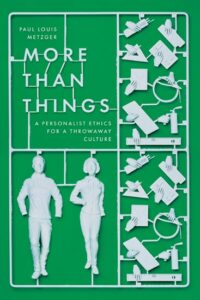 More Than Things: A Personalist Ethics for a Throwaway Culture Paul Louis Metzger (IVP Academic) $48.00 OUR SALE PRICE = $38.40
More Than Things: A Personalist Ethics for a Throwaway Culture Paul Louis Metzger (IVP Academic) $48.00 OUR SALE PRICE = $38.40
One the great, serious books of the year, so very important, and, frankly, theological and philosophical as it may be, it is very readable, intriguingly so. One of the great highlights of 2023 — for me personally and for our store’s reputation, such as it is — was doing a webinar with Dr. Metzger and coming to count him as a friend and ally. This is a great book, inviting us to think through the implications in our personal lives and in our public discipleship, even as we advocate for reforms in the public square, of treating people as persons. This model of “personalism” is exceptional and is explored consistently here showing how it plays out in many sides of life and on different topics, from war and racism to medical ethics and space explorations and so much more. Highly recommended.
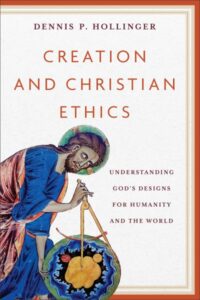 Creation and Christian Ethics: Understanding God’s Designs for Humanity and the World Dennis P. Hollinger (Baker Academic) $29.99 OUR SALE PRICE = $23.99
Creation and Christian Ethics: Understanding God’s Designs for Humanity and the World Dennis P. Hollinger (Baker Academic) $29.99 OUR SALE PRICE = $23.99
This rigorous book arrived late in the year and we want to honor it as a 2023 title, although I’ve just started it here in the new year. Dr. Hollinger is an old acquaintance who has invited me to speak at his campus (when he was Dean of the Chapel at Messiah College) and who has visited our store. We’ve admired his other good books, included a captivation ethics title melding the strengths of virtue ethics and “law” ethics, adding what he called at the time “worldview” ethics. He’s a broad and sharp thinker, prominent for leading several exceptional evangelical institutions, and I am always glad whenever he releases a new work.
Creation and Christian Ethics does just what is needed these days, affirming the doctrine of created reality, asking what the Biblical teaching about the robust and revelatory creation has to do to forming a wise and livable Kingdom ethics.
I am grateful for this as he gets a bit more detailed than the excellent generic approach offer, often, by neo-Calvinists in the tradition of Abraham Kuyper, say, and the rather speculative and strict stylings of those committed to natural law.
There are very impressive endorsements on the back cover from Vincent Bacote, Richard Mouw, Kelly Kapic, Autumn Alcott Ridenour. Scott Rae of Talbot School of Theology (at Biola) says it is a “first-rate work… important”
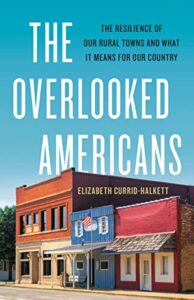 The Overlooked Americans: The Resilience of Our Rural Towns and What It Means for Our Country Elizabeth Currid-Halkett (Basic Books) $32.00 OUR SALE PRICE = $25.60
The Overlooked Americans: The Resilience of Our Rural Towns and What It Means for Our Country Elizabeth Currid-Halkett (Basic Books) $32.00 OUR SALE PRICE = $25.60
I almost listed this in the last post as I appreciated (and enjoyed) it so. It offers rigorous discussions of qualitative and quantitative sociology research but, actually, it doesn’t read like a scholarly text. She is animated, shares her own opinions as she travels the country (and, during the worst of Covid, engages in dozens of Zoom calls) learning to hear and respect people from small towns all across the country. Word of mouth spread and she had plenty of folks eager to chat and she did this gathering of oral histories and honest opinions with great gusto. The book reads almost like a virtual travelogue with lots of excerpts of lots of interviews and her candid take on the views and styles of her rural interlocutors.
And you know what? She ends up having more in common with many heartland folks in flyover country that she ever realizes. She talks economics and racism, religion (and more religion), asking about people’s convictions and concerns, visions and values, faith and frustrations all across these fruited planes. She knows her stuff— social and cultural capitol, meritocracy biases, college aspirations among the working class, the new geography of jobs, etc. etc. Currid-Halkett is a professor of public policy with a speciality in urban and regions planing (at the University of Southern California), has been a Guggenheim Fellow, and holds a chair of modern culture at the Library of Congress. Elite reputation that she may have, she offers this urgent appeal for Americans to connect across a rural-urban divide that, she shows, “is’t so wide after all.” I loved this book and all it’s hopeful detail.
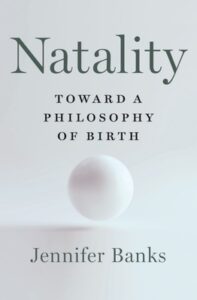 Natality: Toward a Philosophy of Birth Jennifer Banks (Norton) $27.95 OUR SALE PRICE = $22.36
Natality: Toward a Philosophy of Birth Jennifer Banks (Norton) $27.95 OUR SALE PRICE = $22.36
I ordered this because it seemed really rich and I was impressed with the notion — there is a lot written about mortality but not so much about the philopshy of being born. (Ahh, a popular level quasi theological work simply called Birth: The Mystery of Being Born by James Howell did a very nice job in 2020 in their helpful, wise, “Pastoring for Life” series.) I seemed like a winner.
Then a very sharp customer ordered it and then a second person inquired, wondering if we heard of it. It apparantly was reviewed someplace pretty reputable the if two calls in one week on a fairly obscure philosophical treatise means anything, I realized I had called it right. Natality is remarkable, rare, maybe, but important. Hooray. Little did I know that she was a person of faith and that writers that are important to me would grace the back cover. Check this out:
In this resplendent tapestry, each chapter a riveting discovery, Jennifer Banks witnesses the hidden gestations within the wombs of literary history. Natality is not just about giving birth. Natality is at the heart of culture care, of all generative making, and it opens paths uncharted.–Makoto Fujimura, artist, author of Art and Faith: A Theology of Making
Natality is a quietly disruptive book. At a time when public discussion of motherhood and childbirth too quickly devolves into political talking points, Jennifer Banks unearths voices from the past that challenge us to consider the profound and inscrutable nature of birth. Natality reminds us that there has never been a singular conversation around childbirth, but by tending to the mystery, beauty, and contradictions of birth, we contemplate humanity itself.–Kristin Kobes Du Mez, author of Jesus and John Wayne
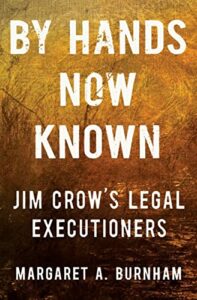 By Hands Now Known: Jim Crow’s Legal Executioners Margaret A. Burnham (Norton) $30.00 OUR SALE PRICE = $24.00
By Hands Now Known: Jim Crow’s Legal Executioners Margaret A. Burnham (Norton) $30.00 OUR SALE PRICE = $24.00
It may be that, officially, this is considered (not unlike other on this list) a trade book and not a scholarly text. But, still, I list it here because it is excellent, exhaustive, history and exceptionally rigorous writing about important details of our nation’s past (particularly 1920 – 1960) and, yes, how that lingers into todays social and political landscape. It isn’t so academic to be difficult, but it is a hard read, unpleasant, ugly. Yet, it is one of the great books of the year, important and demanding, in so many ways. I very highly recommend it…
By Hands Now Known official released near the end of 2022 and earned great accolades on the “best of” lists of 2022. I started it in 2023, so I’m naming it here. By the way, it was a Finalist for the prestigious 2023 Los Angeles Times Book Prize for History.
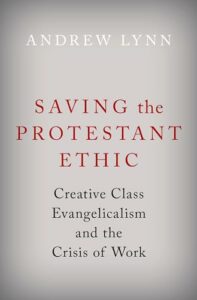 Saving the Protestant Ethic: Creative Class Evangelicalism and the Crisis of Work Andrew Lynn (Oxford University Press) $35.00 OUR SALE PRICE = $28.00
Saving the Protestant Ethic: Creative Class Evangelicalism and the Crisis of Work Andrew Lynn (Oxford University Press) $35.00 OUR SALE PRICE = $28.00
I am sure you know that one of our passions — not shared by all our readers, but we keep trying to share the good news — is how embracing God’s Kingdom message necessarily calls us to vocations in the world. We are missional people living out the Lordship of Christ in all areas of life, including (maybe especially including for most of us) our work lives. We simply must see the need for thinking Christianly about the philosophy of and the practices that flow from, a uniquely Christian approach to our particular careers and jobs. At it’s best, this is the conversation emerging from what we can call a movement — the “faith and work” conversation or the movement to related Sunday worship and Monday work, however you want to describe this call to marketplaces, shop floors, schoolrooms, farming fields, medical clinics, or the sacred spaces of home and childcare. You get the point.
There have been many inspiring books about all of this and now Oxford University Press has brought us a goldmine of insight, a scholarly overview of this movement and the pros and cons of the way it has been advanced. Andrew Lynn is a Postdoc Fellow at the famous Institute for Advanced Studies in Culture at the University of Virginia where his work spans organizational theory, religious studies, and the history of ideas surrounding ethics and economics. This book “captures the in-group tensions and creative adaptation” among American evangelicals as they “navigate changing class and political dynamics that shape American society.” It has been heralded as an “extraordinary descriptive project’, “masterful”, and “impressive.”
Decades ago Oxford published a bit of a manifesto studying the early days of the faith in the marketplace movement written by David W. Miller, now Director of the Princeton University Faith & Work Initiative. Miller has reviewed this book and offers much insight about it.
He writes:
“The faith at work movement is an ongoing and evolving social movement, not a flash in the pan or a passing fad. Andrew Lynn brings us a strong contribution to the growing number of scholarly studies of the surprisingly diverse nature of the faith at work movement. Lynn’s provocatively titled Saving the Protestant Ethic focuses on and brings us fresh insights into the conservative evangelical Protestant wing of the movement, whose search for meaning and purpose drives their economic activity.”
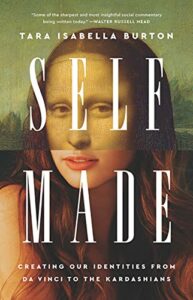 Self Made: Creating Our Identities From Da Vinci to the Kardashians Tara Isabella Burton (Public Affairs) $30.00 OUR SALE PRICE = $24.00
Self Made: Creating Our Identities From Da Vinci to the Kardashians Tara Isabella Burton (Public Affairs) $30.00 OUR SALE PRICE = $24.00
A few years back Tara Burton caused a bit of a buzz as many thoughtful Christian pundits we citing her amazing book, Strange Rites: New Religions for a Godless World. She has a PhD from Oxford and has written for forums as unique as American Internet and National Geographic. Her new one is stunningly researched, deep, thoughtful, offering a
Here is how the publisher describes this study of identity formation:
As the forces of social media and capitalism collide, and individualism becomes more important than ever across a wide array of industries, “branding ourselves” or actively defining our selves for others has become the norm. Yet, this phenomenon is not new. In Self-Made, Tara Isabella Burton shows us how we arrived at this moment of fervent personal branding. Through a series of chronological biographical essays on famous (and infamous) “self-creators” in the modern Western world, from the Renaissance to the Enlightenment to modern capitalism and finally to our present moment of mass media, Burton examines the theories and forces behind our never-ending need to curate ourselves.
Wow, this is a very important idea and she is an energetic, interesting author. You should consider this.
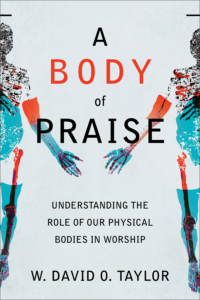 A Body of Praise: Understanding the Role of Our Physical Bodies in Worship W. David O. Taylor (Baker Academic) $26.99 OUR SALE PRICE = $21.59
A Body of Praise: Understanding the Role of Our Physical Bodies in Worship W. David O. Taylor (Baker Academic) $26.99 OUR SALE PRICE = $21.59
This is the sort of academic book that should have a wide readership, certainly in seminaries and in places preparing pastors, preachers, and worship leaders. And, you would think, also in well educated churches. If you are a pastor, choir member, worship leader, liturgist, or maybe you teach Sunday school and teach children and youth about worship, this sort of robust creational theology will stretch your mind and enrich your worldview. That is, it will help you imagine a world the way God sees it, including our bodies. God must love matter, C.S. Lewis once quipped, He sure made a lot of it. Indeed.
So, then, given that, what is the role of the physicality of worship? Artists and those advocating for a more aesthetically pleasing and artfully enriching worship space have helped us all embrace some attention to the colors and banners and vestments and arrangement of chairs and maybe flowers in our spaces. But what about our very bodies that inhabit those spaces? What about the very presence, embodied (I’d say in literal space or through for-real, virtual / on-line participation) of our bodies, our various, frail and fragile, strong and sexy, large and small, from various tribes and people groups? We are all made in the image of God which certainly involves our creaturely selves, and, of course, our senses.
This excellent book is not just about using more color for the eyes or incense for the aroma or hip surround-sound for our ears (although, heavens, if some churches don’t invest in better microphones and basic sound enhancement, I don’t know what they are thinking. Geesh.) This good book goes beyond the obvious and asks deep questions about the human body, why it has not been considered much in worship studies, and how God’s own design for our embodiment might influence how we think about and construe and practice regular corporate worship. And, yes, Taylor more than once attends to the questions about those with disabilities or handicapping conditions. His footnotes are fascinating and offer a whole new curriculum for further generative study. The book is pretty ecumenical and wil be helpful for almost anyone willing to work through this thoughtful text. It is one of the most surprising and best books of 2023.
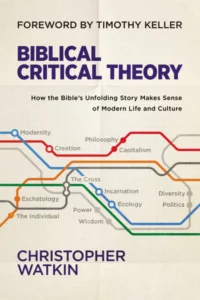 Biblical Critical Theory: How the Bible’s Unfolding Story Makes Sense of Modern Life and Culture Christopher Watkin (Zondervan Academic) $49.99 OUR SALE PRICE = $39.99
Biblical Critical Theory: How the Bible’s Unfolding Story Makes Sense of Modern Life and Culture Christopher Watkin (Zondervan Academic) $49.99 OUR SALE PRICE = $39.99
As you might guess, I was very excited to read this; Keller’s endorsement meant something and the vision of using the Scriptures wisely as a worldview shaping, formative text which would set us towards culture (with a critical edge) seemed ideal for the transforming vision we need for living in the “city of God even as we are living within the city of man” (as Augustine put it.) William Edgar, a top cultural apologetics thinker (and jazz musician) declares that this book is a feast. Bruce Ashford says it is “effervescently brilliant.”
I am not as taken with it as these esteemed thinkers have been but it surely is a very important book.
Christopher Watkin’s expert, timely compendium of Christian Scripture’s subversive engagement of dominating themes of our modern age brings welcome healing to our world. — Esther Lightcap Meek, author Longing to Know and Doorway to Artistry
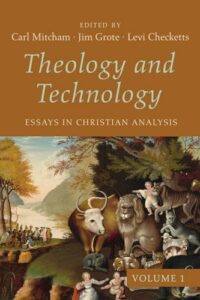 Theology and Technology: Essays in Christian Analysis edited by Carl Mitcham, Jim Grove, Levi Checketts (Wipf & Stock) $26.00 OUR SALE PRICE = $20.80
Theology and Technology: Essays in Christian Analysis edited by Carl Mitcham, Jim Grove, Levi Checketts (Wipf & Stock) $26.00 OUR SALE PRICE = $20.80
In the Spring and into the Summer of 2023 it seemed like discussions about artificial intelligence and ChatGPT and the like look the nation by storm. Trying to bring some perspective to the often alarmist debates I did a special, long BookNotes column (June 11, 2023 if your searching for it) about technology, digital culture, and a few books addressing the pros and cons of AI. In that listing I was reminded of this weighty volume on our shelves and I was delighted to mention it. This is actually the first volume of a two volume set, a collection of essays inspired by and in conversation with a seminal piece from forty years ago. I’ll let the publisher explain it:
“The first volume offers five general attitudes toward technology based off of H. Richard Niebuhr’s five ideal types in Christ and Culture. The second volume includes biblical, historical, and modern theological engagements with the place of technology in the Christian life. This ecumenical collection ranges from authors who enthusiastically support technological development to those cynical of technique and engages the Christian tradition from the church fathers to recent theologians like Bernard Lonergan and Jacques Ellul. Taken together, these essays, some reproductions of earlier work and others original for this project, provide any student of theology a fitting entree into considering the place of technology in the realm of the sacred.”
We were especially glad to see an important essay, as important now as when it was written decades ago, by Egbert Schuurman, who taught engineering and reformational philosphy at several universities in The Netherlands. He served in the Senate, as well.
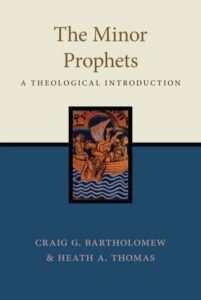 The Minor Prophets: A Theological Introduction Craig Bartholomew & Heath A. Thomas (IVP Academic) $45.00 OUR SALE PRICE = $36.00
The Minor Prophets: A Theological Introduction Craig Bartholomew & Heath A. Thomas (IVP Academic) $45.00 OUR SALE PRICE = $36.00
I have read (or skimmed) many volumes, long and short, easy and difficult, on the so-called minor profits, the twelve, with Hebrew names like Amos and Joel and Hosea and Nahum. The more I read the more I am convinced these are major voices for our times. The writers of this commentary certainly agree and the tone of this — which is rigorously thoughtful and very well informed (Bartholomew is one of the best Bible guys writing and you should know his work.) As it says on the back cover — and this really is central! — “the good news from the minor prophets is that even in dire times, God speaks.” It will take someone with insight into hermeneutical questions and cultural awareness to help us hear God’s voice in these odd texts, and Bartholomew * Heath are up for the last. Both are connected to the Kirby Laing Centre for Public Theology in Cambridge (although Thomas is President at Oklahoma Baptist University.)
This may be a primer but at over 380 pages, it is detailed enough. It’s historical-redemptive, biblical-theological orientation and framework makes this more than a customary survey. It offers, as one put it, “unblinking honesty and uncompromising hope.” Highly recommended for anyone who reads the Bible seriously.
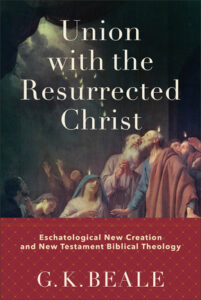 Union with the Resurrected Christ: Eschatological New Creation and New Testament Biblical Theology G.K. Beale (Baker Academic) $49.99
Union with the Resurrected Christ: Eschatological New Creation and New Testament Biblical Theology G.K. Beale (Baker Academic) $49.99
Holy smokes, this hefty, well-bound, scholarly book certain deserves another shout-out in addition to our first announcement of it when it released in April, ’23. It is, I’ll admit, a sequel to the highly regarded A New Testament Biblical Theology and it fleshes out nineteen “significant theological realities and benefits of the believer’s union with the resurrected Christ.” I do not think you have to read the first one, however, as this really is a summarizing, practical application of the historical-redemptive, Biblical theological approach to doing New Testament work. It is, though, sturdy, heavy, academic, what Richard Gaffin at Westminster Theological Seminary says is the “mature culmination” of much of Beale’s “decades-long biblical theological work.” Impressive? It sure is, if you are trained in this sort of thing. Some will find it a slow slog but for those with the eyes to see, it is surely nothing short of brilliant.
As Robert Yarbrough of Covenant Theological Seminary says, “I am not aware of another book that demonstrates so sweepingly the relevance of Christ’s resurrection and ascension to believer’s union with him in its rich benefits and inexhaustible glories.”
Okay then. Strap in. We are united with Christ (and participate in His work) and are incorporated into His resurrection (within the body of others who are likewise blessed.) We are living now in a being-renewed creation, holy as it is. This heavy theological hope is punctuated with “application” sections, a nice touch for what some call this prolific author’s magnum opus.
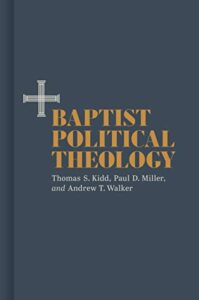 Baptist Political Theology edited by Thomas Kidd, Paul D. Miller & Andrew Walker (B+H Academic) $59.99 OUR SALE PRICE = $47.99
Baptist Political Theology edited by Thomas Kidd, Paul D. Miller & Andrew Walker (B+H Academic) $59.99 OUR SALE PRICE = $47.99
I am not a Baptist and, knowing what we know about the SBC these days, I was not particularly interested in this big collected volume. And then I saw the table of contents and realized who all was in it. My goodness, for anyone interested in responsible, evangelical social ethics and Christian political theory, this is a resource that is not to be missed.
It is a handsome, thick volume— almost 775 pages! — it includes masterful contemporary scholars highlighting various topics such as “Baptists and the Civil War” (by Gregory Wills), “Religious Liberty” (by Albert Mohler) “Just War and Baptist Political Theology” (by Paul Miller) and “The African American Baptist Tradition” by Kenneth Reid. Nathan Finn does one called “The Christian Right: From Reagan to Trump.”
There are historical studies on Baptists and slavery and such and there are more contemporary studies of contemporary issues like environmentalism and bioethics and gender.
And then there are very insightful pieces on various individuals — a few historical ones are on names like Roger Williams and John Leland and Isaac Backus. There is a good piece on progressive Baptists focusing on Walter Rauschenbush and others; there is one on the “political theology of Martin Luther King, Jr” by Daniel Lee Hill, and one on the late 20th century giant, Carl Henry. This is a very sharp anthology and, to be honest, one that ought to be used to shape the public witness of conservative evangelicals.
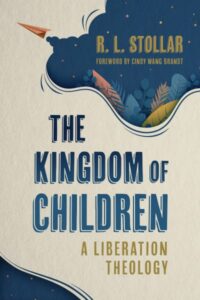 The Kingdom of Children: A Liberation Theology R.L. Stollar (Eerdmans) $24.99 OUR SALE PRICE = $19.99
The Kingdom of Children: A Liberation Theology R.L. Stollar (Eerdmans) $24.99 OUR SALE PRICE = $19.99
I highlighted this at BookNotes when it first came out this fall — little did I know then just how fascinating it would be and how important this project is. I am not sure I agree with all the methodology or conclusions, even, but that is all right. Few have written so provocatively about a theology of childhood and we really need to be inspired by this sort of conversation. Agree or not, this kind of theological orientation isn’t just arcane stuff for academics, but should undergird and shape how we think about parenting, families, and, of course, the church — from worship practices to Christian education, mission and (obviously) creating safe spaces for the kids among us.
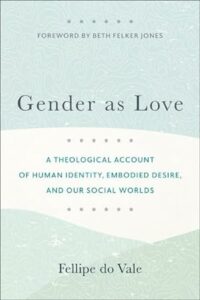 Gender as Love: A Theological Account of Human Identity, Embodied Desire, and Our Social Worlds Fillipe do Vale (Baker Academic) $34.99 OUR SALE PRICE = $27.99
Gender as Love: A Theological Account of Human Identity, Embodied Desire, and Our Social Worlds Fillipe do Vale (Baker Academic) $34.99 OUR SALE PRICE = $27.99
I have only started this — it landed in our store in early December — so I can’t say much. But the foreword by Beth Felker Jones was simply one of the most generous and compelling introductions to a book I’ve seen in a long time. It made me want to dive in and honor the author as Jones so highly recommends. Others, too, trust the integrity and scholarship of this evangelical professor.
It claims to be a fresh and holistic approach to understanding gender (and I’ll admit I don’t even know what that means, a holistic approach.) It does says that it attempts to break current deadlocks within gender theory and theology” by drawing on questions about gender framed by the more foundational theology of the nature of human love. Which, of course, is grounded in the love of the Triune God.
Here is what Amy Peeler says:
A breath of fresh air that has the marks of a rush of the Spirit, do Vale’s work clears the confusion, fear, and acrimony that has clouded around the concept of gender. Gender as Love provides erudite guidance through the theory and, even more, rich exegetical and theological resources for living justly in response to God’s undeserved gifts, including the gift of gender. The joining of confidence in Christ with an epistemic humility that results in godly patience makes this author and this work a timely gift and a necessary read. — Amy Peeler, Wheaton College, author of Woman and the Gender of God
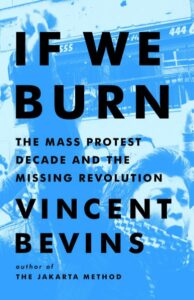 If We Burn: The Mass Protest Decade and the Missing Revolution Vincent Bevins (Public Affairs) $30.00 OUR SALE PRICE = $24.00
If We Burn: The Mass Protest Decade and the Missing Revolution Vincent Bevins (Public Affairs) $30.00 OUR SALE PRICE = $24.00
This is not exactly a scholarly work but I list it here because the reporting and coverage — vibrant and first-person account that it is — is grounded in such a remarkable knowledge of history and recent anti-fascists movements, that my head was swimming just reading about how very much this journalist and writer knows. Those who know his hefty, riveting, expose of the brutality of repression in Indonesia, The Jakarta Method, (where, with US approval, maybe a million people were murdered) will know he is one heck of a reporter. His background study is exceptional and his brave, on the ground connections, are amazing.
This book tells a fascinating story and suggests a fascinating thesis: there were, in about a decades time, uprisings all over the world — remember Arab Spring? He documents the groups that met and the comrades that risked arrest, torture, or worse, over and over, to claim public spaces in repressive regimes. He mets up with the hackers and punks and trade unionists and students and old revolutionaries, some who ended up martyred, and he listened well. (Do you remember the story about the US State Department under George W. Bush training movements across the world to use digital tools? Andrew Sullivan wrote a famous piece in The Atlantic, “The Revolution Will Be Twittered.” From Iran to Turkey to Ukraine, Brazil to Hong Kong to Chile, there were performative protests, marches, actual revolutionary efforts to dislodge power, and some reformists efforts to get activists elected. All failed. All. Failed.
What happened? Bevins, writing from South America, watched years worth of on-going protests among street leaders in the cities of Brazil, and wondered how word traveled (through which social media channels and which underground papers) from nation to nation, across continents, from South America to North Africa to the Far East (and, for a bit, even to New York City for “Occupy Wall Street.”) How did these seemingly disparate movements (some drawing on high level Marxist and Leninist discourse, others inspired by Western democratic ideals, others inspired by churches or religious organizations) work together and connect (or did they)? What compromises were forced upon them by the powers that were? What sort of plans did they have?
If We Burn is, in the words of Greg Grandid (Pulitzer Prize-winning author of The End of the Myth) says “this is a wondrous work of mystery writing, an effort to solve the riddle: why has a decade of large-scale rolling revolts produced no revolution, no significant structural reform?” He continues:
“I can’t think of any journalist other than Bevins who would dare to ask such a question, or be capable of weaving together seemingly discrete global events into a stunning history of the now.”
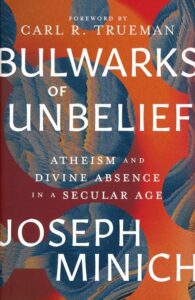 Bulwarks of Unbelief: Atheism and Divine Absence in a Secular Age Jospeh Minich (Lexham Academic) $32.99 OUR SALE PRICE = $26.39
Bulwarks of Unbelief: Atheism and Divine Absence in a Secular Age Jospeh Minich (Lexham Academic) $32.99 OUR SALE PRICE = $26.39
Many of our customers a few years ago were taken with the big, fat volume The Rise and Triumph of the Modern Self: Cultural Amnesia, Expressive Individualism, and the Road to Sexual Revolution (and then the more accessible, abridged version, Strange New World: How Thinkers and Activists Redefined Identity and Sparked the Sexual Revolution) by the often cranky, if brilliant, theologian and cultural critic. Agree or not with the details or normative proposals, his study of historical and philosophical shifts towards “expressive individualism” is important.
This recent 2023 volume by Jospeh Minich carries a vital foreword by Professor Trueman in which he draws the connections. Trueman’s first sentence cites Charles Taylor and moves to explain the importance of Minich’s methodology (which draws on the tradition of phenomenology.) As Trueman promises, “this is neither a lament nor simply a descriptive analysis of where we are today. Dr Minich also presses forward to positive constructive.”
Does that make this more than a resource for those wanting to understand the below the surface zeitgeist of our secularizing culture? Is it apologetics of a particularly deep sort? In the first pages of Minich’s introduction he tells a story of Herman Bavinck how little he address atheism in his massive early 20th century dogmatics. He follows that up with the fictional character of a John Updike story who, in 1910, “felt the last particle of faith leave him.” And I was hooked.
I don’t mean to sound overly heady (as I have not read Charles Taylor’s magnum opus) but Michael Horton promises that “if you found Charles Taylor’s analysis persuasive I think you’l find Minich’s even more so.” Wow.
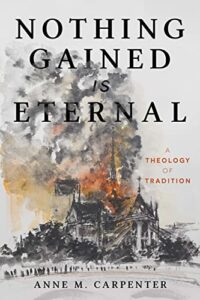 Nothing Gained is Eternal: A Theology of Tradition Anne M. Carpenter (Fortress) $34.00 OUR SALE PRICE = $27.20
Nothing Gained is Eternal: A Theology of Tradition Anne M. Carpenter (Fortress) $34.00 OUR SALE PRICE = $27.20
I have a young Roman Catholic friend (who happens also to know quite a bit about the insight of Bernard Lonergan) who sometimes tells me the very best theological stuff coming out in his thoughtful circles. Ann Carpenter is, apparantly, quite the rising rock star in theological circles and this book — “a theology of tradition” — is heady, rigorous, above by own pay grade, but, apparently, very significant. Her work has been called inventive and ambitious, an argument “poised to usher in a new wave of theological reflection on tradition.”
If this is systematic theology, it is analyzing questions about tradition versus liberation, I guess, united those things that ought not be seen as oppositional, building bridges within, at least, various Roman Catholic camps. Andrew Prevot of Boston College says it is “a provocative work of conceptual synthesis and prophetic insight.” Jennifer Newsome Martin (of Notre Dame) calls it “at once a celebration, a chastening, and an expansion of conventional formulations of religious tradition.” This is about history, about action, and, I gather, about memory. Whew.
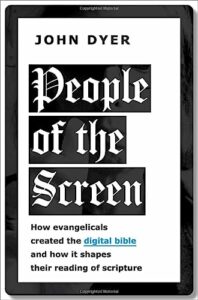 People of the Screen: How Evangelicals Created the Digital Bible and How It Shapes Their Reading of Scripture John Dyer (Oxford University Press) $29.95 OUR SALE PRICE = $23.96
People of the Screen: How Evangelicals Created the Digital Bible and How It Shapes Their Reading of Scripture John Dyer (Oxford University Press) $29.95 OUR SALE PRICE = $23.96
I really, really liked John Dyer’s little introduction to thinking Christianly about contemporary technology, a title published by Kregel, now updated, called From the Garden to the City: The Place of Technology in the Story of God) and when I realized it was this same author doing academic research on the influence and even impact of reading the Bible digitally, I was all ears. As a programmer himself, and as his first book shows, Dyer is interested in a wholesome, Biblical perspective of the benefits and perils of digital culture. But in this book he is asking more pointedly a question about dignity technology for Bible readers.
I often find it odd when somebody pulls out a phone to read a Biblical text, especially in worship. I’ve got my reasons. But this is more about the subliminal aesthetics of not holding a physical, enduring book, but the bigger question of our perceptions of the Bible in a digital society.
The history of all this is longer than you know, I bet, and if you are interested at all in Bible software you’ll find this intriguing. You’ll be delighted at the lovely prose in this wise bit of reporting and evaluation and, more, you will find it compelling. This is a topic that is nearly ubiquitous and few are writing about it. This book is a must.
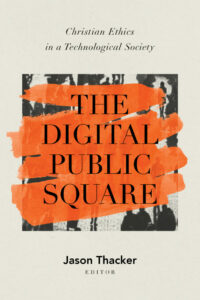 The Digital Public Square: Christian Ethics in a Technological Society edited by Jason Thacker (B&H Academic) $34.99 OUR SALE PRICE = $27.99
The Digital Public Square: Christian Ethics in a Technological Society edited by Jason Thacker (B&H Academic) $34.99 OUR SALE PRICE = $27.99
Speaking of digital culture, I have highlighted this before at BookNotes, too, and find it to be a one-of-a-kind resource at this point where people of thoughtful evangelical faith weigh in on the proper questions about justice in the public arena as we think about questions of digital life together. That is, there are essays here about legal theory, copyright stuff, hate speech, freedom of (online) speech, questions of censorship and sexual ethics and conspiracy theories. As it says on the back cover, “Top contributors, including David French, Patrica Shaw, and many others, cast a distinctly Christian vision of a digital public theology to promote the common good throughout society.
You’ll find Bonnie Kristian here, Keith Plummer, Jason Thacker, of course. Blurbs on the back are from Matthew Kaemingk, Dru Johnson, Ben Sasse, and Russell Moore.
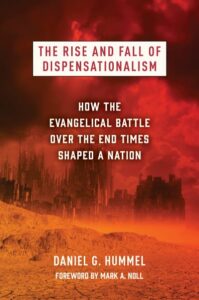 The Rise and Fall of Dispensationalism: How the Evangelical Battle Over the End Times Shaped a Nation Daneil G. Hummel (Eerdmans) $29.99 OUR SALE PRICE = $23.99
The Rise and Fall of Dispensationalism: How the Evangelical Battle Over the End Times Shaped a Nation Daneil G. Hummel (Eerdmans) $29.99 OUR SALE PRICE = $23.99
With a foreword by award winning historian Mark Noll this book (weighing in at over 350 pages) is a thick, careful, wide-ranging study of the unique (and mostly American) theology of dispensationalism, that, naturally, gives rise to speculations about the rapture, the end times, the role of Israel, and those supposedly “left behind.” As most BookNotes readers know, this is a contentious and — in the grand scheme of church history — oddball view that, despite the millions of copies of The Late Great Planet Earth and the “Left Behind” franchise, is not fully Biblical or theologically sound. (And yet, a book about being “rapture ready” was a best seller this fall.)
The Rise and Fall… literally explores where this notion came from, its prominence in certain evangelical circles, and how the question about it all “shaped a nation” from pop culture to politics. Yep — who knew that in-house Christian theological divisions influenced our culture and set the stage for, well, all sorts of civic mayhem.
Daniel Hummel is one smart cookie and his work is nearly magisterial; it is without a doubt the most interesting, broad, and vital stuff I’ve read on this well-worn topic. With rave reviews on the back from John Fea and Molly Worthen and others, it is surely one of the most discussed religious books of 2023. Very impressive.
Don’t believe me? Listen to Richard:
What do you say about a historical study that reads like a whodunit? Dan Hummel’s book is a page turner, shedding light on details that I already knew from dispensationalist pop culture, filling in the gaps through patient analysis and good storytelling. Historians will love his patient analysis; it’s the storytelling that hooked me. At the end of each chapter, I had to know what came next. Not only is The Rise and Fall of Dispensationalism a superb academic study; Hummel’s analysis of the gap left by the decline of dispensationalism helps us understand the ideological crisis of the so-called evangelical church today. — J. Richard Middleton, professor of biblical worldview and exegesis, Northeastern Seminary, author of New Heaven and New Earth: Reclaiming Biblical Eschatology
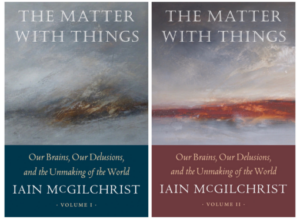 The Matter With Things: Our Brains, Our Delusions, and the Unmaking of the World Volumes I and II Iain McGilchrist (Perspective Press) $95.99 – no discount on this item
The Matter With Things: Our Brains, Our Delusions, and the Unmaking of the World Volumes I and II Iain McGilchrist (Perspective Press) $95.99 – no discount on this item
Okay, now I’m just showing off. I haven’t even opened these two volumes from their shrink-wrapping, so can’t speak to their contents or writing style or, well, much of anything other than to say that Iain McGilchrist is a lively, exceptionally innovative, and astute writer (who maybe needs an editor — I don’t know.) Each one of these volumes looks to be nearly 800 pages, and together they have to be among the most exceptional academic releases of the decade. Released in paperback earlier in 2023 only in the UK, some folks who love his work were immediately interested or so we heard. You may know his previous major book — intriguing as it is captivating — The Master and His Emissary: The Divided Brain and the Making of the Western World (Yale University Press.) It is a big, serious book we’ve often stocked, now out in a second edition.
Living, I’ve heard, on the Isle of Skye off the coast of Scotland, Dr. McGilchrist describes himself as a psychiatrist, neuroscience research, philosopher, and literary scholar. He is a true polymath and is also erudite and intellectually ambitious — and has been called “the William James of our time.” This two-volume set is said to be seminal, game-changing, unsurpassed, without parallel, a truly magnificent achievement. It is about learning from reality, moving toward relationally, reciprocity, harmony, maybe, writ large. Volume one is subtitled “The Ways to Truth” and Volume two is titled “What Then Is True?” We can be sure that he critiques and provides an alternative to the reductionism of scientific materialism, working in not only his expertise of neurological research but in terms of story, narrative, and the visionary search for meaning.
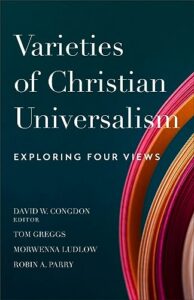 Varieties of Christian Universalism: Exploring Four Views edited by David Condon (Baker Academic) $24.99 OUR SALE PRICE = $19.99
Varieties of Christian Universalism: Exploring Four Views edited by David Condon (Baker Academic) $24.99 OUR SALE PRICE = $19.99
Don’t hate me for showing this. You know, one of the longest reviews I ever wrote — a four-part BookNotes and then a video clip — was my ruminations about the 2011 hubbub around the Love Wins book of Rob Bell, who himself wasn’t then fully adamant about a Christ-bought universalism, but wrote nicely about it. I framed the topic, explored the Biblical teaching about the renewal of all things, explained some of the unfair accusations hurled at Bell, and mostly came out saying folks should read the lively little book and make up their own darn minds.
Older work from the likes of the generous Edward Fudge influenced the thoughtfully tentative hopes of evangelical leader John Stott (about not universalism as such, but about how some may be annihilated, as per the Hebrew worldview, rather than living in eternal agony.) Since then books on the topics of heaven and hell, salvation and judgement, have continued to come out, with clever titles like Razing Hell and, then, of couse, the brilliant Orthodox thinker, David Bentley Hart, released in 2019, That All Shall Be Saved.
This new book offers four different theologies of Christian Universalism, and while it is enough to make your head swim at times, these point/counter-point volumes are excellent ways to get up to speed on the lay of the land and the nuances within contending views. All four of these favor a universalism of sorts, but each have their theological and Biblical reasons for making the particular kind of case that they do.
The four views are (hold on to your hat, this gets deep): patristic, evangelical, post-Barthian, and existential. You may be surprised by the thoughtful hope these theologians offer.
I love some of the gracious recommendations for it, in this case, one from a Pentecostal scholar and one from an Orthodox theologian:
This book introduces four strong sets of arguments by thinkers who have been exploring these matters substantively over extended periods of time. Come ready to engage with the warrants and justifications for these various universalist options, and if you do, you might become a better theologian, if not a better Christian, even if you remained unconvinced about becoming a universalist in any of the ways invited to in these pages. — Amos Yong, Fuller Theological Seminary, author, Mission After Pentecost: The Witness of the Spirit from Genesis to Revelation
Caricatures and misrepresentations often fuel theological debates, especially on controversial themes such as Christian universalism. These essays offer clarity on the variety of universalist theologies in response to the perennial question of Christian universalism, at a time when this debate is again having a moment and in a way that does not offer a definitive conclusion but provides the conditions for a real conversation. — Aristotle Papanikolaou, Orthodox Christian Studies Center, Fordham University
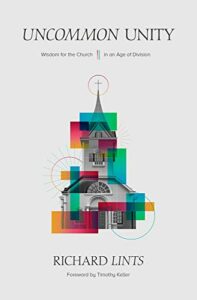 Uncommon Unity: Wisdom for the Church in an Age of Division Richard Lints (Lexham Press) $29.99 OUR SALE PRICE = $23.99
Uncommon Unity: Wisdom for the Church in an Age of Division Richard Lints (Lexham Press) $29.99 OUR SALE PRICE = $23.99
Perhaps it is right to end this big list of some of my favorite serious reads this year with this one, that I am reading slowly and still savoring. It is a rigorous work by a serious scholar, but it is by no means a dry, academic tome. This is a plea from the heart and a wise contribution to many such books calling on us to work towards some sort of unity within the broken body of Christ. In this age of division, how can we bear witness to the grace and love that is to characterize the church? How can we think about the goodness (and limits to) diversity? Is there are connection between “denominations and democracy”?
Curiously, Lints — serving as a consulting theologian with the Redeemer City to City efforts — exposes problems with what he calls “the inclusion narrative of democracy” and shows a better away forward for fostering unity in the midst of extreme diversity. This has great implications that can help fund our advocacy for a genuinely pluralistic society; at the end of the day, it seems, this book is less about ecumenical unity within the church, but how our vision of being included by the gospel might spill over to provide a more enduring framework for our American civic culture, mired with disunity that it is.
I like the evaluation of Anthony Bradley, an African American scholar (and former professor of the late Kings College in NYC) who says of it:
Uncommon Unity is the beginning of the imagination needed to carry the application of God’s redemptive mission deep into the twenty-first century.
“The beginning of the imagination.” That’s a good line, maybe applying to many books, maybe a way to think about why we read nearly any books. May we all be willing to use these great gifts of books, even those that are more demanding of our time, attention and pocketbooks, to savor, to learn, to have our attitudes (and our imaginations) awakened and refined, for the sake of the world.
+++
TO PLACE AN ORDER
PLEASE READ, THEN SCROLL DOWN AND CLICK ON THE “ORDER HERE” LINK BELOW.
It is helpful if you tell us how you want us to ship your orders.And if you are doing a pre-order, tell us if you want us to hold other books until the pre-order comes, or send some now, and others later… we’re eager to serve you in a way that you prefer. Let us know your hopes.
The weight and destination of your package varies but you can use this as a quick, general guide:
There are generally two kinds of US Mail options and, of course, UPS. If necessary, we can do overnight and other expedited methods, too. Just ask.
- United States Postal Service has the option called “Media Mail” which is cheapest but can be a little slower. For one typical book, usually, it’s $4.33; 2 lbs would be $5.07. This is the cheapest method available and seems not to be too delayed.
- United States Postal Service has another, quicker option called “Priority Mail” which is $8.70, if it fits in a flat-rate envelope. Many children’s books and some Bibles are oversized so that might take the next size up which is $9.50. “Priority Mail” gets much more attention than does “Media Mail” and is often just a few days to anywhere in the US.
- UPS Ground is reliable but varies by weight and distance and may take longer than USPS. Sometimes they are cheaper than Priority. We’re happy to figure out your options for you once we know what you want.
If you just want to say “cheapest” that is fine. If you are eager and don’t want the slowest method, do say so. It really helps us serve you well so let us know. Keep in mind the possibility of holiday supply chain issues and slower delivery… still, we’re excited to serve you.
BookNotes
SPECIAL
DISCOUNT
20% OFF
ALL BOOKS MENTIONED
+++
order here
this takes you to the secure Hearts & Minds order form page
just tell us what you want to order
inquire here
if you have questions or need more information
just ask us what you want to know
Hearts & Minds 234 East Main Street Dallastown PA 17313
read@heartsandmindsbooks.com
717-246-3333
Sadly, as of January 2024 we are still closed for in-store browsing. COVID is not fully over and is truly on the rise. Since few are reporting their illnesses anymore, it is tricky to know the reality but the best measurement is to check the waste water tables to see the amount of virus in the eco-system. It is now getting worse. It is still important to be aware of how risks we take might effect the public good — those at risk, while not dying from the virus, are experiencing long-term health consequences. (Just check the latest reports of the rise of heart attacks and diabetes among younger adults, caused by long Covid.) It is complicated, but we are still closed for in-store browsing due to our commitment to public health (and the safety of our family who live here, our staff, and customers.) Our store is a bit cramped without top-notch ventilation, so we are trying to be wise. Thanks for understanding.
We will keep you posted about our future plans… we are eager to reopen. Pray for us.
We are doing our curb-side and back yard customer service and can show any number of items to you if you call us from our back parking lot. It’s sort of fun, actually. We are eager to serve and grateful for your patience as we all work to mitigate the pandemic. We are very happy to help, so if you are in the area, do stop by. We love to see friends and customers.
We are happy to ship books anywhere.
We are here 10:00 – 6:00 EST / Monday – Saturday. Closed on Sunday.

